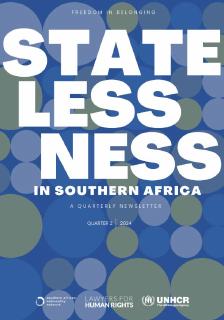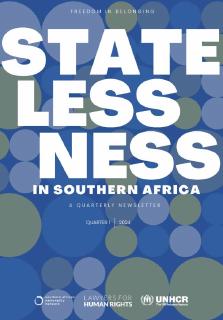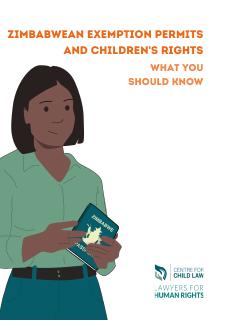“All my children do not have national documents. My plea is for anyone to help my children and I secure national documentation. My children must attend school and further their studies.”
Brian Jambo, descendant of Mozambican settlers in Zimbabwe
KEY ISSUES
- There is no official data available on the number of stateless people in Zimbabwe, but the issue is considered to be significant, especially among descendants of migrant workers who arrived in the country prior to independence.
- Lack of documentation also creates a risk of statelessness, particularly within displaced or border communities and among refugees and asylum seekers.
- Zimbabwe does not provide for access to nationality for a child born on the territory who would otherwise be stateless but does have a generous provision to prevent statelessness for foundlings.
- The 1984 Citizenship Act 1984 is not yet aligned to the 2013 Constitution, which contains a number of measures that could prevent statelessness, including guaranteeing equality and non-discrimination, the best interests of the child, and the right to birth certification, identity documentation, passports and other travel documents.
- In the early 2000s, to enforce a prohibition of dual nationality, citizens were required to prove renunciation of any foreign nationality in order to keep Zimbabwean nationality as an adult, leading many people to be refused recognition of Zimbabwean citizenship that they had previously enjoyed. Despite legal amendments that now allow dual nationality for citizens by birth, this administrative practice continues to affect many people.
- Zimbabwe is a state party to the 1954 Statelessness Convention, but has no statelessness determination or protection framework in place. It is not a state party to the 1961 Convention on the Reduction of Statelessness.
Statelessness in Zimbabwe
Zimbabwe is understood to have a substantial stateless population and is marked by an asterisk (*) in UNHCR’s global statistics, denoting that there is information about stateless people in the country but no reliable data. Zimbabwe is not a party to either of the Statelessness Convention, has no dedicated mechanism for identifying statelessness and no official statistics for statelessness exist. There is no official data available on the number of stateless people in Zimbabwe but UNHCR estimated in 2016 that there were approximately 300,000 people at risk of statelessness in the country. UNHCR arrived at this figure after identifying that people who came to Zimbabwe from neighbouring countries to work on farms and mines during colonial times constituted a particular risk group for statelessness due to the many changes in nationality laws between 1963 and 2003. At its peak, there were 2.5 million farmworkers in Zimbabwe. Using the estimation that 20-30% of these workers were of foreign origin, UNHCR arrived at the number of 300,000 at risk of statelessness within the country. As part of a pledge made at the 2019 UNHCR High Level Segment on Statelessness, Zimbabwe established a joint taskforce on statelessness, that in 2020 validated a joint Department of the Registrar-General and UNHCR Desk Study report on statelessness. As a result of recommendations from this study, additional questions were added to the 2022 Census Questionnaire to try to pick up data on the status of statelessness in the country. A mapping study was stated to be underway in the 2021 UNHCR Global Trends Report statistics on statelessness, but as of 2023, no further information on the study has been made available.
The hundreds of thousands of workers and their descendants constitute a substantial number of those at risk of statelessness in Zimbabwe. Administrative procedures designed to actively enforce the prohibition of dual nationality in the early 2000s had the practical effect of leaving many people to be refused recognition of Zimbabwean citizenship that they had previously enjoyed. Conflict-induced displacement has also left a legacy of challenges for accessing documentation and establishing citizenship. Between 1983 and 1987, thousands of people were killed, and thousands of others detained and tortured by government forces seeking to crack down on an alleged plan by opposition figures to lead an armed uprising in Matabeleland and Midlands provinces. During these operations, which came to be known as the Gukurahundi Massacres, thousands of people were forced to flee their homes and many forcibly displaced people lost their identity documents and were unable to replace them. Those who lost their relatives are still experiencing challenges in obtaining their death certificates and this prevents descendants from providing evidence of their Zimbabwean nationality and registering births and consequently acquiring national identity cards.
Lack of documentation puts other groups at risk as well, such as the marginalised community of the Doma people from Kanyemba in Mbire as well as those residing in border areas around the country. The Parliamentary Portfolio Committee on Defence, Home Affairs and Security issued a report in August 2019 on the specific challenges in accessing primary documents in the Matabeleland South Province. The closer to the border the community is, the more likely the Registrar General’s offices are to restrict access to documentation processes. Expectant mothers in these communities are known to travel to health facilities in other countries to give birth because such facilities are geographically closer than those in Zimbabwe. Even when the child is born in Zimbabwe, they may be taken across the border to be immunized, and there are reports of Zimbabwean Registrar General officials refusing applications for birth certificates on the basis of children having Mozambican immunisation marks. In border communities where people regularly cross borders to trade and access economic benefits from neighbouring countries, such as Botswana, many children born in those neighbouring countries do not have birth certificates, and therefore cannot access documents such as identification cards, when they return with their parents to Zimbabwe. Among all of these populations, the lack of documentation is passed from one generation to the next, limiting social mobility and economic opportunities for entire families.
Certain groups of refugees and asylum seekers in Zimbabwe are also at risk of statelessness. Among them are rejected asylum seekers in refugee camps without any identity documents, and their children who do not receive birth certificates. Former Rwandan refugees who have not returned to Rwanda due to continuing fear of persecution in their country, are also undocumented, together with their children. More than one thousand Mozambican asylum seekers who fled conflict in Mozambique have not yet been issued identity documents recognising refugee or asylum seeker status or any other type of temporary legal residence , and their children born in Zimbabwe are not registered or issued birth certificates.
Following the pledge made at the 2019 High Level Segment on Statelessness, the Zimbabwe Human Rights Commission (ZHRC), a body established under the constitution, launched an Inquiry on Access to Documentation in Zimbabwe. The 2020 National Inquiry Report published as a result found that lack of documentation impacts other rights such as the right to education, access to health and social services, political rights, freedom of occupation, trade and profession, right to administrative justice and freedom of movement and residence, among others. For example, stateless children without birth certificates and IDs are unable to register for school, or register for public examinations, thereby limiting their prospects of future employment.
THE RIGHT TO NATIONALITY IN ZIMBABWE
The main framework for citizenship in Zimbabwe is established by the 2013 Constitution (which replaced the 1979 Constitution). Attribution of Zimbabwean citizenship at birth is mainly based on descent (jus sanguinis). Unusually, the right to citizenship is derived from grandparents as well as parents. A person is a citizen by birth if born in Zimbabwe or abroad and either their mother or their father or any of their grandparents was a Zimbabwean citizen. However, a person born abroad acquires the status (with some exceptions) of “citizen by descent”. In the past, a citizen by descent could not transmit citizenship to a child who was also born abroad. Although this is no longer the case, it is not clear if the change in the rules is retroactive.
Zimbabwe does not provide for access to nationality for a child born on the territory who would otherwise be stateless. It does, however, have a generous provision to prevent statelessness for foundlings: a child of unknown nationality and parents who appears to be less than fifteen years of age when found is presumed to be a Zimbabwean citizen by birth.
A major challenge in interpretating the national legal framework is that the Citizenship of Zimbabwe Act 1984 has not been aligned to the 2013 Constitution. Amongst other problems, it continues to prohibit dual citizenship in all cases, even for citizens by birth. A Citizenship Bill was published by the Ministry of Justice in 2018 that would have addressed this and other issues, but as of 2023 there had been no action taken for it to be adopted by parliament. The Constitution also contains a number of measures that could help to prevent statelessness, for example guaranteeing equality and non-discrimination, the best interests of the child, and the right to birth certification, identity documentation, passports and other travel documents. In addition, in the only exception to the descent-based framework, Section 43 provides for attribution of citizenship by birth to anyone born in Zimbabwe prior to the Constitution’s entry into force, if one or both of their parents was a citizen of a country that is a member of the Southern African Development Community (SADC) and ordinarily resident in Zimbabwe when the child was born. This provision strengthens and extends provisions for SADC citizens in place in legislation since 2003.
Section 39 of the Constitution sets out the grounds on which Zimbabwean citizenship can be revoked, such as fraud, misrepresentation or concealment of a material fact or, for citizens by registration, if a person has unlawfully traded or communicated with an enemy country. It stipulates an explicit prohibition on revocation of Zimbabwean citizenship that results in statelessness. The 1984 Citizenship Act, however, continues to provide that citizens by registration can be deprived of Zimbabwean citizenship even if it leaves the person stateless, where it is ‘conducive to the public good’, on the basis of a number of grounds that include ‘disloyalty’ or ‘disaffection’ to Zimbabwe; for ‘acting in a manner prejudicial to public safety or public order’; for being convicted and sentenced to a serious offence after registration; and for having been a ‘prohibited person’ in terms of the Immigration Act at the time of registration. However, there are very few citizens by registration, so it is unclear whether these provisions continue to be used. In July 2023, the Criminal Law Codification and Reform Amendment Act – better known as the ‘Patriotic Act’ – entered into force. It provides that if a Zimbabwean who is a citizen by registration or a dual citizen participates in talks with hostile nations or a trade boycott, they risk the loss of their citizenship.
DUAL CITIZENSHIP AND STATELESSNESS
The changing provisions on dual citizenship have forced many Zimbabweans of foreign origin to attempt to prove that they are not entitled to a foreign nationality or else face removal of their Zimbabwean citizenship, thereby rendering them vulnerable to statelessness. By effect of section 8 of the 1979 Constitution of Zimbabwe, many had been allowed to retain their foreign nationality and hold Zimbabwean citizenship as dual citizens. Such dual nationality provisions were unusual in comparison to other countries emerging from British colonial rule, and the 1979 Constitution was seen in this regard to be aimed at protecting white interests. An amendment prohibiting dual citizenship was introduced into the Constitution in 1983 and then included in the 1984 Citizenship Act introduced the following year. Under these amendments, Zimbabweans were required to renounce any entitlements they held to a foreign nationality or else face losing nationality of Zimbabwe. For many years, however, the procedural requirement was only to sign a declaration that the person renounced any potential claim to another nationality.
In the elections of 1999, dual citizenship became a central issue after the rise of the opposition party, Movement for Democratic Change (MDC), which was the first political party to attract major support from white Zimbabweans, in particular white commercial farm owners. While the government was able to stay in power, the substantial parliamentary losses incurred to the MDC led to it targeting those sections of the public it deemed to be supporting the opposition party, including measures such as the expropriation of land from thousands of white Zimbabwean farm owners, which in turn directly led to an estimated 1 million farm workers and their families losing their jobs and homes. Further disenfranchisement was created through the 2001 amendment of the Citizenship Act of 1984. Under this amendment, people of foreign origin who had claimed to have renounced foreign nationality were given six months to provide evidence of having done so under the law of the other country (for example, a confirmation by the relevant consular authorities that this had been done), or else lose their Zimbabwean citizenship. This requirement had not been present in the original 1984 Act and the measure impacted hundreds of thousands of descendants of migrants, including both white Zimbabweans and those with origins in another African country.
A further amendment to the Citizenship of Zimbabwe Act in 2003 allowed descendants of migrant workers from the SADC region to ask for confirmation of Zimbabwean citizenship upon renouncing any potential entitlement to foreign citizenship. However, due to bureaucratic barriers, many applications for registration were unsuccessful. As a result of these barriers to documentation, many descendants of migrants are still unlawfully designated as ‘Aliens’ on their IDs, their children have been designated as such on their birth certificates, and they have been deprived of citizenship rights such as the right to obtain travel documents and the right to vote.
ZIMBABWE’S INTERNATIONAL COMMITMENTS
Zimbabwe acceded to the 1954 Convention Relating to the Status of Stateless Persons in 1998. Zimbabwe is not a signatory to the 1961 Convention on the Reduction of Statelessness.
Zimbabwe has acceded to the CRC, ICCPR, CEDAW, ICERD, and CRPD, for which it maintains no reservations against the provisions relating to nationality.
For more information on regional standards and intergovernmental commitments in Africa, see the StatelessHub Africa page.
- Click here to see what Recommendations Zimbabwe has received through the Universal Periodic Review
- Click here to see what Recommendations Zimbabwe has issued through the Universal Periodic Review
- Click here to see what voluntary pledges have been made by Zimbabwe
The content on this page was reviewed by Bronwen Manby, expert on nationality and statelessness in Africa
[Last updated July 2023]
Cover Image by Beauty van Stam
VOICES & EXPERIENCES
-
Migrants and their descendants face barriers accessing dual nationality in Zimbabwe
![Zimbabwe]()
Migrants and their descendants face barriers accessing dual nationality in Zimbabwe
![Zimbabwe]()
“Denying us identity documents as migrants does not only affect adults’ rights but denies our children their rights. It is not only destroying parents but the next generation.”
Affected Person
Zimbabwe has a long history of immigration from Southern African Development Community (SADC) neighbouring countries such as Malawi, Mozambique and Zambia. These migrants and their descendants have been repeatedly subjected to arbitrary denial or deprivation of Zimbabwean nationality due to their foreign origin. While migrants were initially allowed to retain their original nationality and acquire Zimbabwean citizenship as dual citizens, the 1984 Citizenship Act introduced a requirement for those with dual nationality to renounce any foreign citizenship in order to retain their Zimbabwean citizenship. Despite changes to these rules in Zimbabwe’s 2013 Constitution, many who attempt to register as Zimbabwean or obtain nationality document are often still directed to renounce citizenship of their parents or grandparents’ country of origin, which may be impossible in practice.
Voice from We Are Like “Stray Animals” Thousands Living On The Margins Due To Statelessness In Zimbabwe
-
Consequences of not having national documentation in Zimbabwe
![https://www.youtube.com/watch?v=Vn1sh1LFpOs&ab_channel=AmnestyInternationalZimbabwe]()
-
Issues caused by the gap between Zimbabwe’s 1984 Citizenship Act and 2013 Constitution
![Issues caused by the gap between Zimbabwe’s 1984 Citizenship Act and 2013 Constitution]()
Latest Resources: Zimbabwe
-

Statelessness in Southern Africa- Quarter 2 Newsletter
Type of Resource: News/ Media reporting / Blog
Theme: General / Other
Region: Africa
View -

Statelessness in Southern Africa- Quarter 1 Newsletter
Type of Resource: News/ Media reporting / Blog
Theme: General / Other
Region: Africa
View -

Zimbabwean Exemption Permits and Children's Rights What You Should Know
Type of Resource: Learning tool
Theme: Children
View



